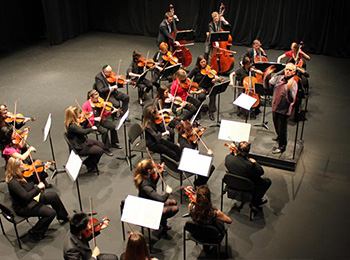The musical life of Toronto is a bit quieter this season, with the funding cut off for the Koffler Chamber Orchestra (KCO).
Last summer the Koffler Centre of the Arts ended its support for the all-strings orchestra, which since 2005, has been led by Jacques Israelievitch, the respected former concertmaster of the Toronto Symphony Orchestra. He is now on the music faculty at York University while maintaining an active schedule as a chamber musician, soloist and recitalist.
The small orchestra, which has a modest budget, was formed nine years ago after Israelievitch was approached by the Koffler Centre.
“What was unusual about it,” Israelievitch said recently, “was the combination of students – some younger, some older – community players (not professionals), and professionals who were leading each section. It made for a very interesting mix. I was trying to get as close as possible to a professional level in these concerts.”
In artistic terms, he often succeeded. The orchestra played a wide range of music, from Bach to contemporary, often to a standard beyond that of other community orchestras in the GTA. But when their home auditorium, the Leah Posluns Theatre in the Bathurst Jewish Community Centre (BJCC), was closed in 2009 and torn down in 2010, the orchestra was left homeless and forced to find other venues. The audience that had been built in the Leah Posluns decreased.
The Koffler Centre is sponsored primarily by the Koffler family, UJA Federation of Greater Toronto, government arts councils and private donors.
Noting the drop in audiences, the centre gradually began to question the rationale for supporting the orchestra. Cathy Jonasson – whose background is in visual art and design – became executive director of the Koffler Centre in February 2014 after working for them as an outside consultant. She praises the quality of the orchestra’s performances and the dedication of Israelievitch and the musicians, but is reluctant to separate a discussion of the orchestra from the centre’s other cultural activities (art exhibits, designer sales, talks by authors, film screenings, small-scale theatre, book awards.)
“The economics of it definitely began to be a problem for us… we weren’t drawing a paying audience,” she noted. “What was the ambition for the KCO? It wasn’t consistent with the overall mandate of contemporary culture that we were engaging with in all the other areas of our program.”
Even in the early days, Israelievitch said the level of marketing and publicity support from the Koffler Centre was “very little.” He thinks it simply lost interest in the orchestra.
“There were changes of staff, there wasn’t that much continuity. It was always somebody different minding the running… and there wasn’t that much to run, but to make sure we had a venue in which to perform and a place to rehearse,” he said. “We would arrive for a rehearsal and they had the wrong room for us. Or the chairs or the music stands were not there – we would be chasing the janitors… We couldn’t contact anybody about it… It was a little bit disorganized. So it was kind of frustrating for us.”
In the past decade, the orchestra performed some 25 concerts in a variety of venues, including two concerts at the Conrad Centre for the Performing Arts in Kitchener, Ont. They played in temples throughout the GTA, in the Al Green Theatre at the Miles Nadal JCC, the Gladstone Hotel downtown, the Glenn Gould Studio, Hart House (University of Toronto), York University, the Art Gallery of Ontario’s Walker Court and the Music Gallery.
Meanwhile, the former site of the BJCC near Bathurst Street and Sheppard Avenue remains an empty plot of land. It isn’t clear when, or if, a prospective rebuilding of the BJCC will occur on the site.
“The board will decide in the next couple of months whether to proceed,” said Morris Zbar, CEO of the UJA Federation of Greater Toronto. He suggested the old building “wasn’t viable any more” and in a state of disrepair. He said the recession set back the timetable for a possible rebuilding. But that old building once provided a home base for the chamber orchestra.
“The original impetus for the KCO was really an interesting one,” Jonasson said, “and it made a lot of sense at the moment it was put together. I think many things have happened to the organization since that time. It doesn’t fit our mandate as well any more. If we’re involved in contemporary programming, if our education imperative is to reach young people and develop a contemporary culture that they identify with, it was becoming something that was tangential to that.”
Yet, to cite one example, the educational aspect of gifted young players working alongside professionals in the orchestra obviously had a positive effect on Jaime Kruspe, a young KCO violinist who was recently named the new assistant concertmaster of the Canadian Opera Company Orchestra.
And the orchestra, in fact, devoted much attention to contemporary music over its 10-year existence, including a concert of music by four Canadian women composers a year ago. It also performed contemporary works by Walter Buczynski, Ödön Partos, Allan Gordon Bell, Gilles Maurice Leclerc, Alexander Levkovich, Andrzej Panufnik and others.
In October 2013, the Koffler Centre moved its administrative headquarters from the Prosserman JCC campus to the downtown Artscape near Queen Street West, quite far from traditional centres of Toronto Jewish life. Jonasson said this move has helped broaden the audience for the Koffler Gallery and other Koffler Centre activity. “If the BJCC is ever rebuilt, it’s not clear that the Koffler Centre would be part of it,” she said.
Israelievitch is trying to resuscitate the orchestra under other auspices. The orchestra would need a stable home for its concerts, and a place to rehearse.
“Certainly the members of the orchestra, those that have pursued the activity through thick and thin, they miss it – I know they miss it, they are very sad to have it stop,” Israelievitch said
